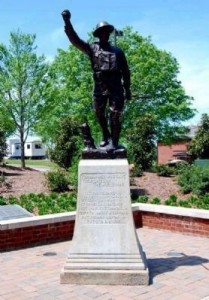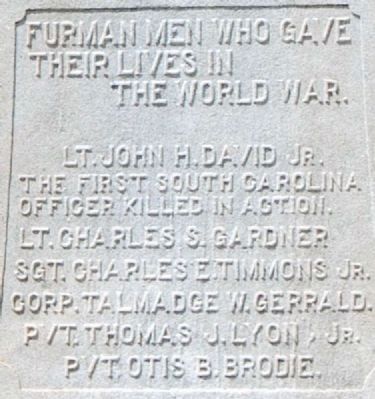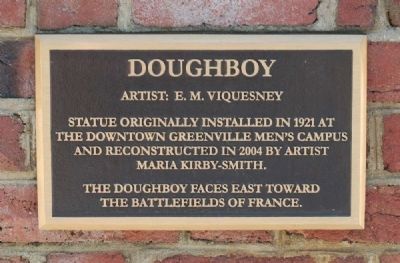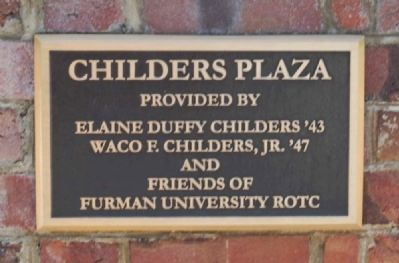In honor of Memorial Day, the James B. Duke Library will operate on an adjusted schedule.
- May 26 – Saturday – CLOSED
- May 27 – Sunday – 1:00 pm – 5:00 pm
- May 28 – Monday – 10:00 am – 10:00 pm
 In 1921, Furman paid tribute to the University’s World War I veterans in a moving ceremony that unveiled a memorial statue, The Spirit of the American Doughboy. The term doughboy was used by European soldiers to describe their American allies. The U.S. troops arrived in France from a training base in Texas that was known for its white adobe soil. The soil often discolored their uniforms, giving them a “doughboy” appearance.
In 1921, Furman paid tribute to the University’s World War I veterans in a moving ceremony that unveiled a memorial statue, The Spirit of the American Doughboy. The term doughboy was used by European soldiers to describe their American allies. The U.S. troops arrived in France from a training base in Texas that was known for its white adobe soil. The soil often discolored their uniforms, giving them a “doughboy” appearance.
The copper sculpture by E.M. Viquesney, depicted a soldier rushing into battle, clutching a grenade in one hand and a rifle in the other. Mass produced during the 1920s and 1930s for communities throughout the United States, the first Doughboy statue placed as a memorial was dedicated on the old campus of Furman University in downtown Greenville on June 7, 1921.
Five hundred and forty Furman men, almost the entire student body of the then all-male college, volunteered for service during the Great War. Six of them died during the war — Pvt. Thomas J. Lyons Jr., Pvt. Otis Brodie, Lt. John H. David (the first South Carolina officer killed in action), Lt. Charles S. Gardner (who, though seriously wounded, refused to be removed from the battle), Sgt. Charles E. Timmons Jr. (who “went to death beyond the call of duty, while aiding men from another company”), and Cpl. Talmadge W. Gerrald (who gave his life trying to save a wounded comrade). Their names are inscribed at the base of the Doughboy.
Since the dedication in 1921, the Furman Doughboy has become one of the University’s most enduring landmarks. In the late 1940s a plaque bearing the names of Furman students lost during World War II was placed at the base of the statue. When Furman moved to its current location, so did the Doughboy. After suffering years of neglect, dents, and vandalism, Furman University’s original Doughboy, was retired to the Upcountry History Museum, and a completely new replacement was cast in bronze by sculptor Maria Kirby-Smith in 2004. The statue is located next to the Physical Activities Center in Childers Plaza, and faces east toward the battlefields of France.



